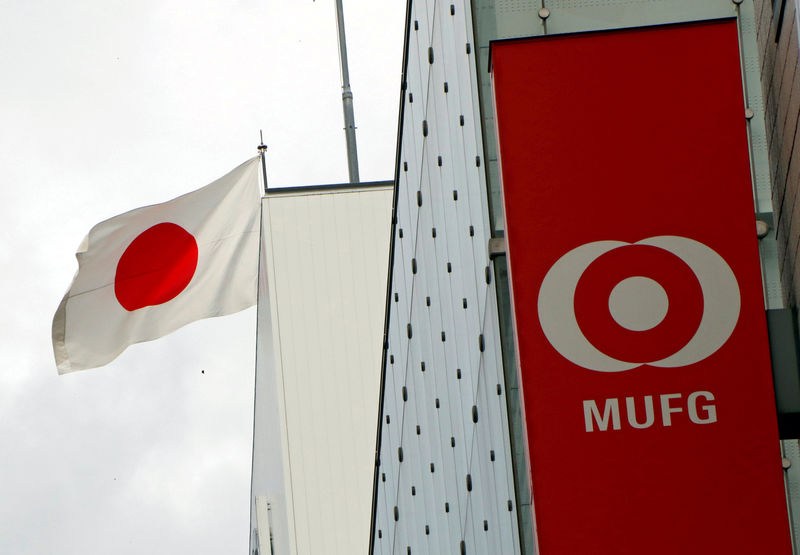 © Reuters. FILE PHOTO: Japan’s national flag is seen behind the logo of Mitsubishi UFJ Financial Group Inc (MUFG) at its bank branch in Tokyo
© Reuters. FILE PHOTO: Japan’s national flag is seen behind the logo of Mitsubishi UFJ Financial Group Inc (MUFG) at its bank branch in TokyoBy Olivia Oran, Karen Freifeld and Michelle Price
NEW YORK (Reuters) – Mitsubishi UFJ Financial Group Inc (MUFG) (T:) on Wednesday sued New York’s banking regulator to stop its effort to continue to supervise Japan’s largest lender after it switched its state branches to federal oversight this week, according to court filings.
The New York Department of Financial Services (NYDFS) has often taken enforcement action against lenders under its purview. MUFG’s subsidiary, the Bank of Tokyo-Mitsubishi, agreed to pay $565 million in penalties in 2013 and 2014 for improperly handling transactions involving countries subject to U.S. sanctions.
In a Nov. 7 letter, the U.S. Office of the Comptroller of the Currency (OCC) said it had given Bank of Tokyo-Mitsubishi UFJ the greenlight to convert branches in four states into federally regulated ones.
Besides New York, the branches are in Illinois, Texas and California.
On Wednesday, the New York regulator issued an order that said the bank and New York branch remain subject to NYDFS supervisory and enforcement activities for any conduct when it was licensed by the watchdog.
A DFS spokesman declined to comment.
In its complaint, filed in a Manhattan federal court, the bank is seeking to stop enforcement of the order.
Bank of Tokyo-Mitsubishi UFJ says the NYDFS’s order violates federal U.S. banking laws which state the OCC’s supervisory powers supersede those of state regulators.
“Without judicial relief, [the bank] will be placed in the untenable position of being subject to a DFS order that requires it to violate both federal law and the directives of the OCC and of being subject to competing demands from state and federal banking regulators,” the Bank of Tokyo-Mitsubishi says in the filing.
A spokesperson for MUFG said the OCC now supervises all of its U.S. banking operations allowing the Japanese lender to “streamline its supervisory and regulatory requirements.”
A spokesman for the OCC said whether a bank chooses to operate under a state or federal charter is a business decision.
“That choice is fundamental to our nation’s dual banking system. The OCC strongly supports the nation’s dual banking system,” the spokesman said in a statement.
STATES CLASH
The OCC has been increasingly seen by bankers as a more industry-friendly regulator under its acting Comptroller Keith Noreika, who was appointed by Republican President Donald Trump to help fulfill his promise to boost economic growth by eliminating financial rules.
Under Noreika, the OCC has begun reviewing strict rules preventing banks from taking risky bets with their own money and is moving to a more flexible approach on assessing banks’ compliance scores, Noreika said on Wednesday.
The expectation federal watchdogs will be more lenient under the Republican administration is creating tension with Democrat state regulators, in some cases sparking legal clashes.
Along with the Conference of State Bank Supervisors, the NYDFS is also suing the OCC over its attempt to introduce a special purpose national bank charter for fintech companies.
Bank of Tokyo-Mitsubishi entered into agreements with the New York regulator in 2013 and again in 2014 to pay a total of $565 million in penalties and submit to increased scrutiny for stripping information from wire transfers that authorities could have used to police transactions with sanctioned countries such as Iran.
As part of the accords, the bank had to move its U.S. sanctions compliance and anti-money laundering operations to New York and install an independent consultant to conduct a review of the bank’s sanctions compliance programs.
Source: Investing.com



























